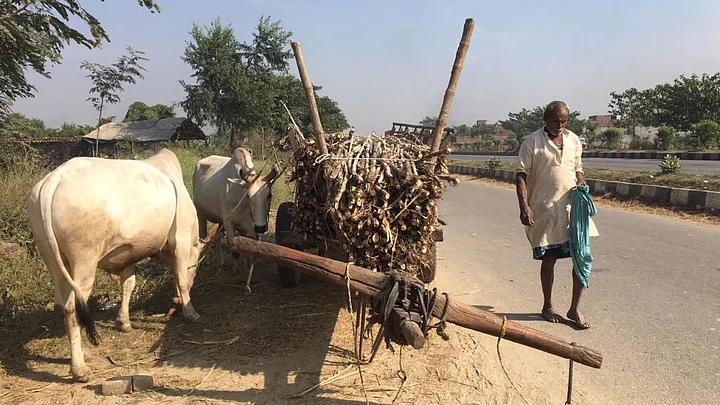Demonetisation is an excellent idea. The arrogance of the wealthy was becoming too much to bear. Corruption will end, and the money taken from the seths will come into our accounts.Phagu Gupta
Gupta stood by his small shack on National Highway 27, watching cars whiz along the seemingly endless east-west corridor that connects Silchar in Assam to Porbander in Gujarat. His small team of workers fed a diesel-powered sugarcane crusher, ladled boiling hot cane syrup into shallow cooling pans, and scraped crystalline jaggery into fist-sized mounds.
The Union government’s decision to scrap the current series of Rs 500 and Rs 1,000 notes has gummed up urban India’s informal economy as thousands queue each day to withdraw small sums of cash from their accounts.
Here in rural eastern Uttar Pradesh, problems are piling up as well, but many expressed their willingness to endure the pain if only to see their wealthy compatriots stand in queue and suffer the way they do each day.
“The rich think they can buy everything with their money,” said Chhaya Devi, who sells rice at a weekly market just off the highway, “Now they must line up for their four thousand rupees like everyone else.”
Kushinagar is one of poll-bound Uttar Pradesh’s poorest districts. The average per capita household consumption is barely Rs 1,600 per month compared to almost Rs 5,000 per month in Gautam Budh Nagar, UP’s relatively wealthy western district. The lack of jobs, education, and opportunity, coupled with rampant siphoning of public funds has fuelled the belief that much of the wealth in the region is a direct outcome of corruption and tax evasion.
Demonetisation, many feel – despite little empirical evidence thus far – shall drastically reduce corruption. Economists say that the amount of black money retrieved will be relatively small – the wealthy have already spirited their money away. Nevertheless, many feel that the Rs 15 lakhs promised to them in the course of Prime Minister Narendra Modi’s 2014 campaign, might finally appear in their accounts.
“Where has the money for the poor gone? Into the pockets to the rich,” said Koeli Devi, in the adjacent district of Gorakhpur, “Now the rich are sweating. They will have to return the money.”
Prime Minister Narendra Modi has done his best to reinforce this impression in his public utterances. “After demonetisation, the poor are enjoying a sound sleep while the rich are running to buy sleeping pills,” he said in an election rally in Ghazipur, Uttar Pradesh on Monday.
Yet a week since his government scrapped 86 percent of the country’s cash in circulation, many said the deterioration of their livelihoods and well-being had been dramatic. If the flow of money didn’t improve soon, they conceded, they might revise their opinions on the policy.
Demonetisation has affected each aspect of rural life: farmers desperate to buy seeds for the winter crop, mothers tending to ailing children, labourers looking for employment, roadside eateries, vegetable vendors, barbers and cellphone shops whose clients are suddenly without money. If the disruption to the rural economy continues, many said, what looks to be a political masterstroke could turn into an election liability at the state polls early next year.
Early this year, Ramgati Patel, a farmer in Kushinagar, made elaborate plans for his daughter’s wedding. He saved money, borrowed from relatives, and left a part of his fields fallow to host the baraat.
“But suddenly we cannot pay for anything,” Patel said, close to tears, “The money is in my account, but how do I get it out?”
Patel said he was willing to suffer like everyone else.
But then things should improve. We shouldn’t have to sacrifice for nothing.Ramgati Patel
Abdul Aziz, Patel’s neighbor, said his relatives had postponed their daughter’s wedding as they had no currency.
Almost a quarter of Indians above the age of 15 own a debit card according to a 2014 World Bank study, but close to 95 percent of all transactions are conducted in cash.
“A majority of Indians live in cash-only ecosystems. They earn in cash, spend in cash, and save in cash,” said Varad Pande, who specialises in financial inclusion at Dalberg Global Development Advisors, a policy advisory firm.
In a way, India’s rural economy is already “cashless”. Farming income is seasonal, and families often survive on informal credit in the long periods between sowing and harvesting.
In a maudlin public appearance, Prime Minister Modi asked for time till the end of December to straighten out the chaos, but many said such a long disruption could push them to destitution.
“I don’t know if we can survive 50 days like this,” said Rajendra Nishad, a mason who commutes to Gorakhpur city each day from his village on the outskirts.
Demonetisation, Nishad said, had frozen traditional village credit networks, “because even the money lenders can’t access their own money, so they can’t lend to anyone.”
Ultimately, Nishad, like most people interviewed for this story, said he expected things to get better because the government “must” have plan.
